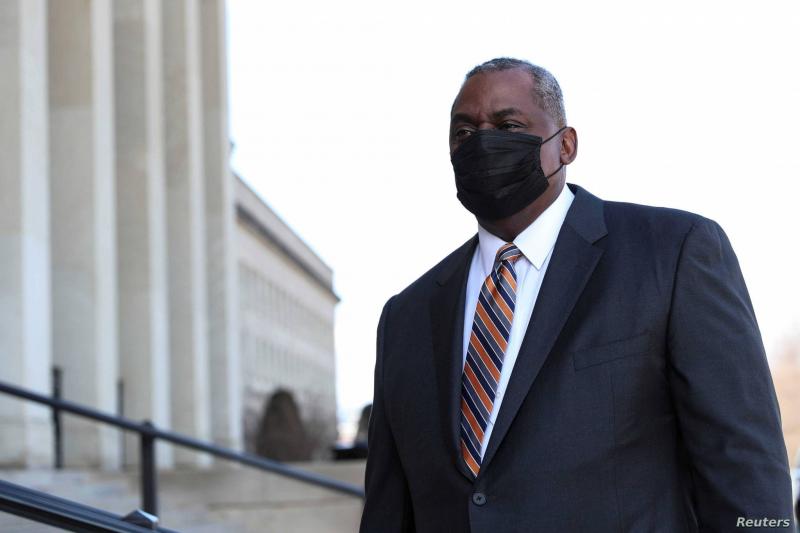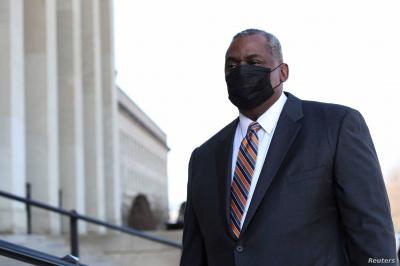US Defense Secretary Lloyd Austin affirmed the United States' commitment to defend the Middle East security given the shared threats facing the region, including Iran's support for terrorism. Speaking at the "Manama Dialogue 2021" conference, Austin stated that the US would not abandon its interests in the region, adding, "We are committed to defending our allies and interests, and we have tens of thousands of troops and will work with allies and partners to protect waterways and defend the region's security."
Austin arrived in Manama on Friday to participate in the Manama Dialogue 2021 as part of a Gulf tour that also includes the Emirati capital, Abu Dhabi. He added, "Iran's threats and its proxies are widespread. We must work together to ensure the collective defense of the region's security, and Iran should know that it cannot undermine our relationships in the area."
He noted that Washington supports the Gulf States' efforts to improve relations with Iran, referring to the talks held between Iran and Saudi Arabia that have not yet yielded tangible results after a series of rounds. The US Secretary provided strict assurances regarding Washington's commitment to the region's security and defending its interests against various shared threats, highlighting four main concerns: the pandemic, climate crisis, terrorism, and Iran's support for terrorism.
Austin mentioned that the Iranian threat is not limited to the nuclear program but also includes "serious challenges" like supporting its proxies in the region to destabilize and the offensive drone program. He continued, "We will return to the negotiation table in good faith. I assure you that we are committed to preventing Iran from acquiring nuclear weapons, as confirmed by President Biden. If Iran wants to return to the international community, it must adhere to international standards. Our options will be open if diplomatic solutions fail."
In 2018, the US unilaterally withdrew from the nuclear deal between Tehran and the major powers in 2015 during the presidency of Donald Trump. The Manama Dialogue began on Friday with an opening speech by John Chipman, CEO of the International Institute for Strategic Studies, and another speech by the Indonesian defense minister discussing his country's relationship with the Middle East and the challenges facing the Indian and Pacific Ocean region.
The US Secretary emphasized that Washington is a global power with a network of international relations and interests worldwide, and it is committed to protecting them, but added that they cannot do this without help from allies and partners. He illustrated this by citing the extensive evacuations carried out by the US in Afghanistan after several Gulf States participated in evacuation operations and providing safe corridors for Americans and Afghans at risk of retaliation from the Taliban.
Austin stated that Washington is working with its allies to provide all types of assistance and long-term investment in security cooperation, joint training, and intelligence sharing. He added, "We will work with allies to deter any aggression in space, cyberspace, air, sea, and land. If we are compelled to deter any aggression, we will win decisively."
The US Secretary also addressed America's stance regarding several countries, including Tunisia, stressing the need for a swift return to the constitution in Tunisia, standing with the Lebanese people during their circumstances, and a firm commitment to Israel's security while supporting a two-state solution to end the Israeli-Palestinian conflict.
Austin reiterated US support for the Abraham Accords, which opened the way for comprehensive diplomatic relations between Israel and Arab states, noting that these new relations create opportunities for shared prosperity and security cooperation. He also affirmed the US support for Saudi Arabia in facing attacks from the Houthis in Yemen, confirming Riyadh's ability to counter these threats.
He stated, "The Saudi air force is defeating 90% of the drones coming from Yemen. Together we will work to achieve a 100% interception rate," pointing out that Washington has deployed systems in the region to address the risks posed by drones. Regarding Iraq and the future of the country in confronting terrorist threats, Austin said, "We have shifted our focus to training Iraqi forces and empowering them, providing the necessary resources. We remain concerned about ISIS and will do our utmost to support the Iraqi government to prevent this group from reconstituting itself."




